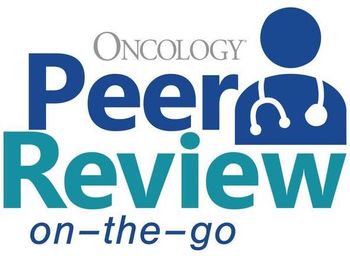
Authors Daniel C. McFarland, DO, and Kirk Harris, MD, spoke with CancerNetwork® about their manuscript on cancer pain’s relationship with opioid use disorder that was recently published in the journal ONCOLOGY®.

Your AI-Trained Oncology Knowledge Connection!


Authors Daniel C. McFarland, DO, and Kirk Harris, MD, spoke with CancerNetwork® about their manuscript on cancer pain’s relationship with opioid use disorder that was recently published in the journal ONCOLOGY®.

Ghassan K. Abou-Alfa, MD, spoke about the recent approval of tremelimumab plus durvalumab for patients with unresectable hepatocellular carcinoma, based on results from the phase 3 HIMALAYA trial.

Patients with relapsed/refractory large B-cell lymphoma may benefit from epcoritamab, the biologics license applications of which were submitted to the FDA.

The addition of capivasertib to fulvestrant resulted in a statistically significant and clinically meaningful improvement in progression-free survival for patients with hormone receptor–positive, HER2-low-or -negative locally advanced or metastatic breast cancer.

Quality of life data from the phase 3 ARASENS study highlighted how early treatment intensification with darolutamide plus standard androgen deprivation therapy and docetaxel improved patient-relevant end points compared with placebo in the management of metastatic hormone-sensitive prostate cancer.

At ASTRO 2022, Phuoc Tho Tran, MD, spoke about the potential benefit of combining salvage radiation therapy and enzalutamide vs placebo in patients with high-risk prostate-specific antigen–recurrent prostate cancer after radical prostatectomy.

Oral selective estrogen receptor degrader camizestrant elicited a statistically significant and clinically meaningful progression-free survival benefit compared with fulvestrant among patients with estrogen receptor–positive locally advanced or metastatic breast cancer.

Supplemental radiation doses delivered concomitantly with hypofractionated whole breast irradiation in 15 fractions demonstrated non-inferior ipsilateral breast recurrence and similar toxicity compared with sequential boosts following whole breast irradiation in high-risk early-stage breast cancer.

Among patients with advanced and/or metastatic hormone receptor–positive HER-2 negative breast cancer, complete estrogen receptor antagonist OP-1250 continued to yield clinical benefits such as reductions in target tumor lesions.

The addition of metastasis-directed therapy to intermittent hormone therapy appeared to improve survival in patients with oligometastatic prostate cancer, according to early data from the phase 2 EXTEND trial.

Patients with prostate cancer who experienced an increase in prostate-specific antigen level after radical prostatectomy appeared to benefit from a short course of androgen deprivation therapy after post-operative immediate salvage radiotherapy.

Patients with CD5-positive relapsed/refractory peripheral T-cell lymphoma may derive benefit from MT-101, which was granted fast track designation by the FDA.

Patients with advanced solid malignancies may benefit from treatment with next-generation tissue factor–targeting antibody-drug conjugate XB002.

Induction chemotherapy combined with concurrent lobaplatin chemoradiotherapy improved safety outcomes without sacrificing efficacy vs a cisplatin-based regimen in patients with head and neck squamous cell carcinoma.

Patients with gastroenteropancreatic neuroendocrine tumors may benefit from treatment with radionucleotide therapeutic 177Lu-edotreotide, which received fast track designation from the FDA.

Rogaratinib showed similar efficacy and manageable safety compared with chemotherapy in the management of FGFR1/3 mRNA–positive locally advanced or metastatic urothelial carcinoma.

At 2022 IGCS, Ursula A. Matulonis, MD, spoke about the toxicity profile observed with mirvetuximab soravtansine monotherapy in patients with folate receptor α–high platinum-resistant ovarian cancer reported from the phase 3 SORAYA study.

Data from the phase 3 SPOTLIGHT trial indicated that 18F-rhPSMA-7.3 PET yielded a positive detection rate in patients with recurrent prostate cancer, and increased along with prostate-specific antigen level.

Data from the phase 3 CALLA trial indicated that multidisciplinary collaboration and a good quality control strategy are key to providing optimal chemoradiotherapy delivery in locally advanced cervical cancer.

Based on results from the phase 1/2 MajesTec-1 trial, the FDA has granted accelerated approval to teclistamab-cqyv for patients with relapsed/refractory multiple myeloma.

Results from the phase 2 NRG-HN004 trial found durvalumab plus radiotherapy did not show improved progression-free survival vs cetuximab in patients with locoregionally advanced head and neck cancer who had a contraindication to cisplatin.

Stereotactic body radiation therapy is a new standard of care option for patients with locally advanced hepatocellular carcinoma, according to a presentation on the phase 3 NRG/RTOG 1112 trial assessing sorafenib combined with stereotactic body radiation therapy.

Results from the UK phase 2 PEACOCC trial found improved outcomes with pembrolizumab monotherapy in patients with previously-treated advanced clear cell gynecological cancers.

Based on findings from the phase 3 CABASTY trial, a fixed 16 mg/m2 dose of cabazitaxel every 2 weeks vs 25 mg/m2 every 3 weeks reduced neutropenic complications in elderly patients with mCRPC.

Findings from a retrospective cohort study found that immune checkpoint inhibitors induced promising responses in the first- and second-line treatment of head and neck squamous cell carcinoma.

Quizartinib has received priority review from the FDA for the treatment of patients with newly diagnosed acute myeloid leukemia that is FLT3-ITD positive.

Based on results from the phase 3 HIMALAYA trial, the FDA has approved tremelimumab plus durvalumab in patients with unresectable hepatocellular carcinoma.

According to findings from the phase 3 PACE-B trial, genitourinary and gastrointestinal toxicities were similar among patients with prostate cancer receiving conventionally fractioned or moderately hypofractionated radiotherapy and stereotactic body radiotherapy.

Across various cancer types, stereotactic ablative body radiotherapy was found to be a safe method for treating oligometastes.

Joseph Mikhael, MD, discussed the need for increased diversity in clinical trials, specifically in the hematology space.